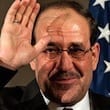Iraq is in the middle of a civil conflict that but for the lack of international media interest would be called a war. Sunni/Shia competition has existed for generations. This blood rivalry underpinned Saddam Hussein’s dictatorial rule and dominates Iraqi political life today. Only now the domination is on the majority Shia side. There are nearly twice as many adherents of Shia Islam than Sunni in Iraq. Post-Saddam the Shia have the determinant hand and the Sunni struggle against this new reality. The Americans and British who fought to make possible this “democratic rule of the majority” have gained little in political terms from shifting the power center.
The governments of Saddam Hussein relied on their local relations with tribal leadership to maintain political control in traditional Sunni areas. The Shia were treated with the “carrot and stick” method. Those local Shia leaders willing to cooperate were financially, and where appropriate, politically, rewarded. This favored treatment was backed up by harsh policing and, where necessary, military actions. Such a system no longer works the same way. The Shia are in control and the political infrastructure of the old Baath Party no longer exists. Perhaps more importantly, Prime Minister Nouri al-Maliki does not have the charisma nor several levels of police that made Saddam’s rule possible.
Within the Sunni community there remains a continuing allegiance to the tribal structure, though it no longer has the relatively unchallenged leadership of the past. In place of this traditional authority framework is a combination of central and regional government direction made effective only when operating in concert with traditional local leaders. The latter used to be primarily tribal, but now it is undercut or strengthened, depending how it’s politically aligned, by well-organized groups coordinated under an al Qaeda-in-Iraq banner. The degree that this system has grown since U.S. troops left Iraq is less important than the fact Prime Minister al-Maliki since his second term began in 2010 has been unable to resist Shia demands for increased control over all the principal levers of government.
Shia political leaders, with Maliki either leading or acquiescing, have kept Sunnis from top army positions and restricted national policing posts to loyalists, usually Shia. In fact, the political division within the country has become so sectarian that Sunni politicians are said to have been “hounded from power.” With this lack of any semblance of an effort to integrate Sunnis into the majority leadership has come a clear withdrawal of Sunnis from all aspects of ordinary political life.
The internal political issue in Iraq is far more complicated than is being reported. To begin with, the Shia are divided by family, character of their particular interpretation of their own sect, political competition within Iraqi Shia-ism and all the other things that divide people when many of them have radically different lifestyles. In somewhat the same fashion of a “normal” division of a populace, the Shia are unified in their belief that Sunnis are innately untrustworthy. That attitude mirrors the basic Sunni belief about Shia.
If the Shia are divided among themselves, the Sunnis are also divided. The al Qaeda-in-Iraq movement has several major factions and competition for leadership thereof. This contest for ascendancy within the al Qaeda grouping has been carried into the Iraqi Sunni participation on the side of the rebels in Syria. In fact, at the end of May this year there was a severe schism between the principal Iraqi and Syrian factions of al Qaeda operating against Bashar al-Assad’s government forces. Not only have Western intelligence agency operatives been thwarted in dealing with the various rebel fighting groups because of the weakness (to the point of non-existence) of any semblance of unified command, but there have been reports of al Qaeda units in near combat with each other over authority in a given sector.
The Iranians are viewed by the West as having a special kinship with the Iraqi Shia, and to an extent that is true. It is also true, however, that there is now and has been in the past outright antagonism between Iraqi and Iranian religio-political wings. It is clear that just because Iraqi Shia and Iranian Shia follow the same broad religious confession, they are expected to be automatically truly fraternal. The best proof that this was not true came during the Iran-Iraq war of the 1980s, during which Saddam Hussein was able to win over the support of a substantial number of Iraqi Shia by allowing them the coveted membership in the Iraqi Baath Party. Privilege trumped ancient religious schism in this instance, but today pragmatism rules; Iraq and Iran cooperate in every area mutually beneficial.
Iraq is currently faced with a reoccurrence of bloody confessional conflict. Each week scores of Sunni and Shia die in roadside attacks, car and truck bombings, murder and mayhem directed at group gatherings of both sides. Sunni police who have cooperated with the Shia political authority are blown up by fellow Sunni. Totally innocent women and children die in market place attacks by whichever group seeks that neighborhood’s destruction in this sectarian violence. The body count of both Sunni and Shia dead and wounded is in the hundreds monthly.
A new political bargain must be struck in Iraq. But with the rebellion in Syria complicated by its own sectarian divisions, there seems little chance for peace to break out between the Sunni and Shia in Iraq in the near future. The real question is whether the United States can and will be able to avoid being involved in Syria beyond the already announced supply of military equipment and weapons to select rebels. Of course, then there is the contagion that threatens to follow in Iraq.
























